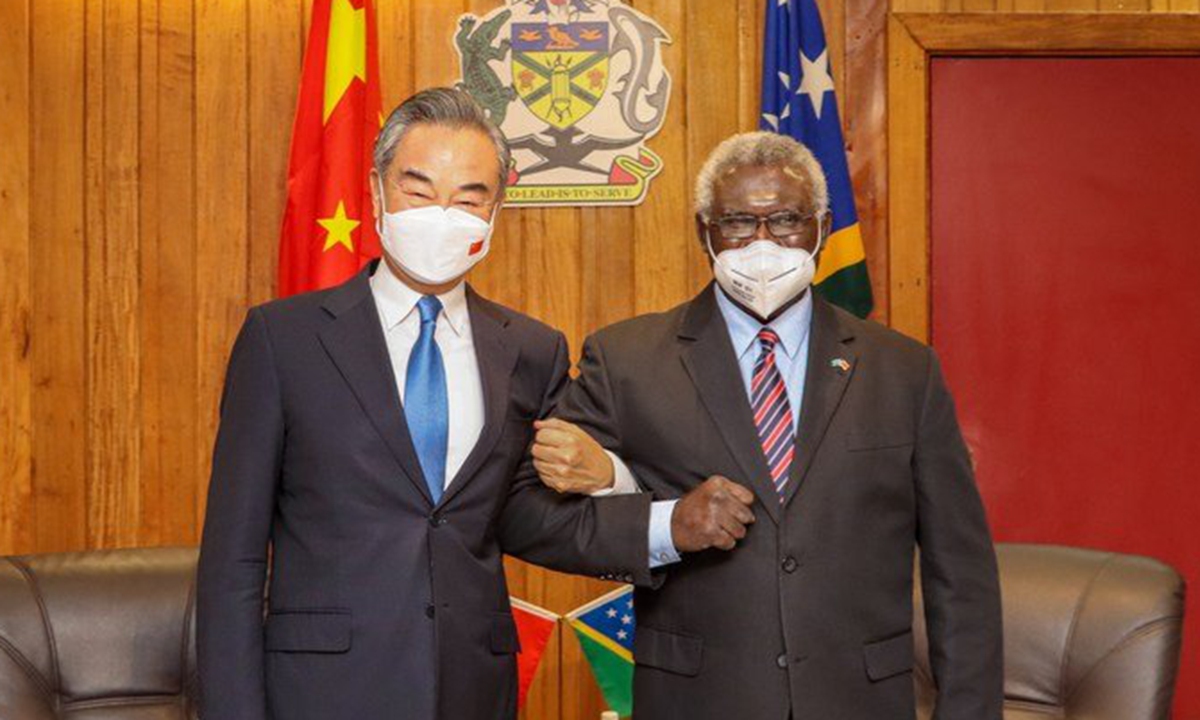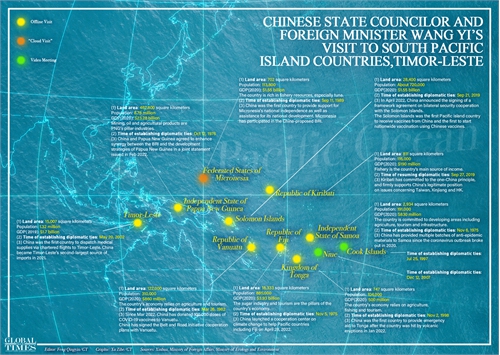Chinese FM starts trip to South Pacific; ‘Solomon Islands shows respectable courage in developing ties with China’

Chinese State Councilor and Foreign Minister Wang Yi (left) holds arms with Solomon Islands Prime Minister Manasseh Sogavare after arriving in Solomon Islands for a visit on May 26, 2022. Photo: Courtesy of Chinese Ministry of Foreign Affairs
Chinese State Councilor and Foreign Minister Wang Yi has arrived in the Solomon Islands on Thursday to kick off his important tour of the South Pacific island nations. Chinese experts said that as the first stop of the visit, the Solomon Islands showed great courage in strengthening ties with China to truly serve its own national interest despite growing pressure from the US and Australia.
According to Chinese Foreign Ministry's website, the Solomon Islands and China pledged in Honiara on Thursday to further enhance their mutually beneficial cooperation to serve as a paragon of mutual trust between China and the Pacific Island countries (PICs).
After establishing diplomatic ties with China in 2019, and experiencing riots in 2021, the Solomon Islands has come under a lot of pressure from the West, especially Australia, as Honiara was determined to develop ties and even start security cooperation with China. Chinese experts said this took great courage and wisdom from the leaders of the country and the local people, and China will prove to them and other PICs that China is trustworthy and fully capable of helping them to become more developed and more independent to withstand bullying and pressure from Western countries.
Solomon Islands Prime Minister Manasseh Sogavare and visiting Chinese State Councilor and Foreign Minister Wang Yi on Thursday expressed willingness to forge "iron-clad" ties and deepen cooperation between the two countries, the Xinhua News Agency reported.
Sogavare said China has become the biggest cooperative partner of the Solomon Islands on basic infrastructure and a reliable development partner, and expressed thanks to China for providing anti-pandemic supplies, rapid-test equipment and sending medical teams to his country.
He also expressed appreciation to the Chinese side for sending police supplies and police advisers to help maintain social order on the Solomon Islands after the riots in Honiara.
Wang is visiting the Solomon Islands as part of his tour of the South Pacific island nations, which will also take him to Kiribati, Samoa, Fiji, Tonga, Vanuatu and Papua New Guinea, as well as Timor-Leste from Thursday to June 4.
Late starter's advantage
While meeting with Wang, Acting Governor General of the Solomon Islands John Patteson Oti said since the establishment of diplomatic relations between the two countries, the development of bilateral ties has made significant progress, and the visit by the Chinese delegation will bring new highlights and add new impetus to the cooperation between the two sides.
As a member of the international community and a member state of the United Nations, the Solomon Islands is ready to strengthen coordination and cooperation with China in multilateral fields, Oti noted.
Noting that diplomatic relations with China mean the Solomon Islands has one more good friend as well as a sincere and reliable partner, Wang said it is expected that the bilateral ties will forge a high ground of win-win cooperation and become a paragon of mutual trust between China and the PICs.
China looks forward to seeing bilateral relations give play to our late starter's advantage and become a pacesetter of mutually beneficial cooperation and a model of mutual trust between China and island countries, Wang said at the meeting with Oti.
Chen Hong, president of the Chinese Association of Australian Studies and director of the Australian Studies Center at East China Normal University, told the Global Times on Thursday that "the late starter's advantage means that China-Solomons diplomatic ties were established in 2019, but have realized fast development in a few years. The island country has been bullied and coerced by the US and some of its Western allies for a very long time, and its economic model has remained the same as it was in the colonial period, so once it kicks off full cooperation with China, it will see remarkable comprehensive development in all fields."
The PICs' cooperation with the US and Western countries always comes with strings attached, analysts said, and they have already found that cooperation with Western countries cannot be truly win-win.
Respectable courage
"Australia is the biggest source of aid to the PICs, and this aid mostly serves the goal of training pro-US and pro-Australia forces in the countries, and is also focused on the fields of promoting social diversity," Chen said, noting that "the aid did bring some help to the PICs but it is not what is most needed for the region at this stage."
The PICs need infrastructure construction, and improvements in the economy and people's livelihood, and this is what they can get from China, analysts said.
"The Solomon Islands has shown very respectable courage, as it dares to make the correct decision for its own interests, especially under heavy political pressure and coercion from the US and the West," Chen said.
After the security cooperation deal with China was severely opposed by the US and Australia, Solomon Islands Prime Minister Sogavare said in March that the backlash against his country's security negotiations with China was "very insulting". In a speech to parliament, Sogavare expressed criticism of larger countries which he said didn't care if Pacific Islands went underwater because of climate change and considered the region "the backyard of big Western powers," media reported.
Chen said the Solomon Islands, as well as other PICs, are independent sovereign countries, and if Western countries like the US and Australia still treat them with a condescending manner, their policy won't work and the Solomon Islands won't be the last to stand up and oppose them.
Exaggerating security cooperation
Western media outlets like Reuters paid almost no attention to the China-PICs cooperation in the fields of economy, climate change or other issues related to development and people's livelihood, but only scrutinized the security cooperation. However, experts said the Western media has hyped the cooperation as issues such as "militarizing the South Pacific," and China's security and policing cooperation with the PICs is very normal, so some recent reports from Western media are aimed at hyping up the tense atmosphere, and local people don't share the West's anxiety as they respect and welcome China.
Reuters reported on Wednesday that "China will seek a region-wide deal with almost a dozen PICs covering policing, security and data communication cooperation" when Wang hosts a meeting in Fiji during his trip. The Reuters report also said the cooperation raised concerns of a "new Cold War" and brings instability to the region.
In response to a reporter's question about the China-Solomon Islands framework agreement on security cooperation, which has aroused some debate and suspicion, Wang Yi said that the framework agreement on security cooperation negotiated between China and Solomon Islands is the cooperation between sovereign countries, which aims to assist Solomon Islands in improving its policing and law enforcement capabilities and support Solomon Islands to better safeguard its social security while also protecting the safety of Chinese citizens and institutions in Solomon Islands, which is reasonable and legitimate with everything being operated in an open and transparent manner.
Tinian Reiher, a member of parliament from Kiribati, another South Pacific island country, disagreed with the Reuters report. He told the Global Times on Thursday that signing the China-Solomons security deal is "the prerogative of the government and the people of the Solomon Islands to decide… This security deal should not be taken as a threat" to any other countries.
"I don't know why we should be concerned about the China-Solomon security deal when we have our own internal issues that are a priority and that we need to address. We certainly do not feel any instability by such a deal," he said, adding that he is not concerned that Kiribati's interests will be affected.
Niu Li, executive director of the Pacific Research Center at Beijing Foreign Studies University, told the Global Times that the West politicians and Western media are obviously using the "China threat theory" to mislead the public by exaggerating relevant issues or even hyping that China is going to build military bases to expand its influence in the region.
"In fact, China had policing cooperation with Tonga and Fiji long ago. They even had mutual military visits and training before. But why didn't the Western media report on these before?" Niu noted.
According to the fact sheet on China-PICs cooperation published by the Chinese Foreign Ministry on Tuesday, "Senior defense and military officials of PICs?have paid multiple visits to China, and participated in events such as the Beijing Xiangshan Forum and the Forum for Senior Defense Officials from Caribbean and South Pacific Countries."
"In recent years… the Ministry of Public Security of China has held 23 training sessions on capacity building for PIC law enforcement agencies since 2017, which were attended by a total of 490 law enforcement officers, according to the fact sheet.
Specifically exaggerating China's security cooperation with the Solomon Islands shows that some Western media are trying to hype up the China threat theory to serve the anti-China strategic goal of Western governments, analysts said.


